Junio de 2017/Fuente: Banco Mundial
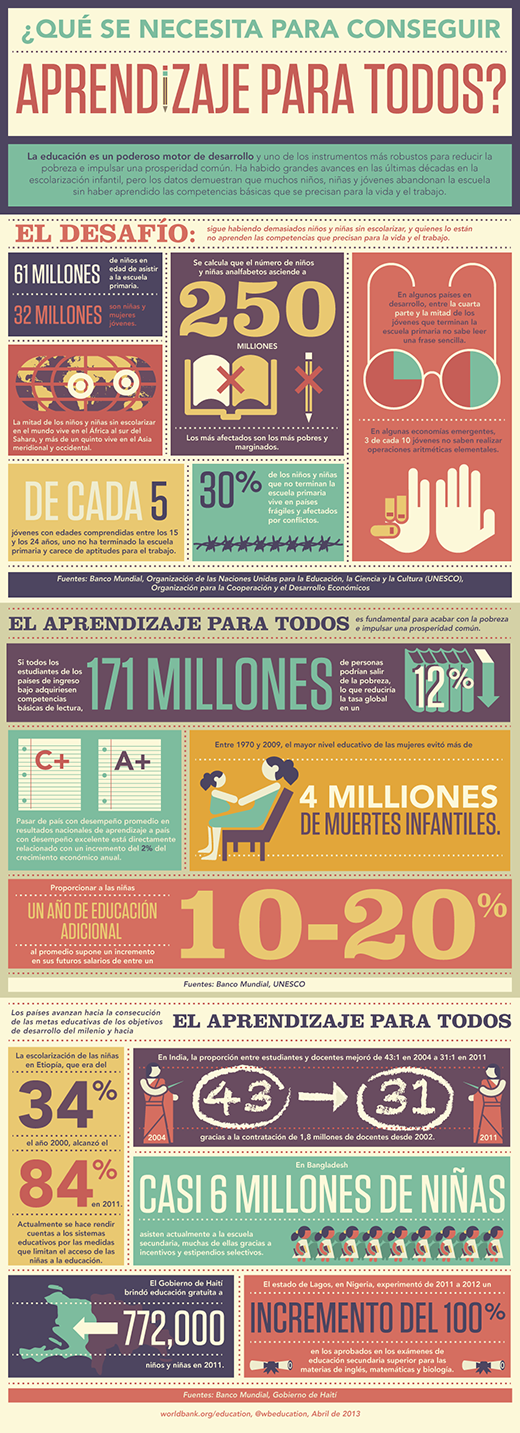
Fuente: http://www.bancomundial.org/es/news/feature/2013/04/15/what-will-it-take-to-achieve-learning-for-all
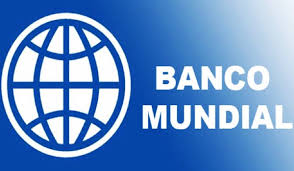
Junio de 2017/Fuente: Banco Mundial

Fuente: http://www.bancomundial.org/es/news/feature/2013/04/15/what-will-it-take-to-achieve-learning-for-all
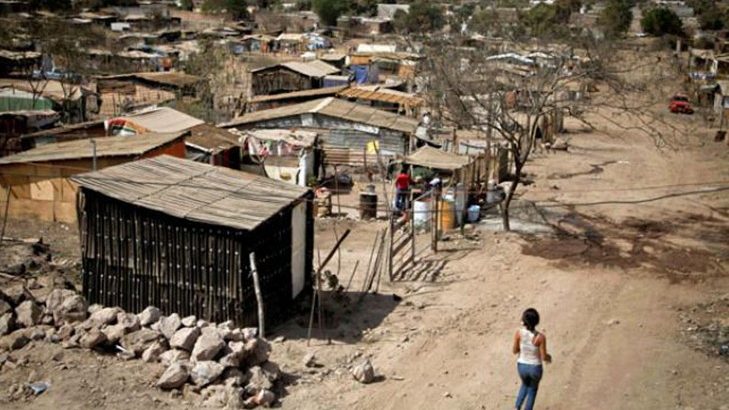
Junio de 2017/Fuente: Terra
La pobreza en el mundo podría reducirse a la mitad si todos los adultos terminaran la educación secundaria, de acuerdo con un informe de política de la Organización de las Naciones Unidas para la Educación, la Ciencia y la Cultura (UNESCO) publicado hoy aquí.
Según las estimaciones de la UNESCO, «cerca de 60 millones de personas podrían escapar de la pobreza si todos los adultos tuvieran tan solo dos años más de escolaridad».
«Si todos los adultos terminaran la educación secundaria, 420 millones de personas podrían salir de la pobreza, reduciendo el número total de personas pobres en más de un 50 por ciento a nivel mundial y en casi dos tercios en África Subsahariana y Asia Meridional», subrayó la organización con sede en París, Francia.
El documento de la UNESCO titulado «Reducir la pobreza mundial a través de la educación primaria y secundaria universal» demuestra «la importancia de reconocer que la educación es clave para acabar con la pobreza en todas sus formas y en todas las latitudes», resaltó el organismo.
«El nuevo análisis sobre los beneficios de gran alcance de la educación publicado hoy debería ser una buena noticia para todos aquellos que trabajan en el Objetivo de Desarrollo Sostenible para erradicar la pobreza de aquí a 2030», declaró la directora general de la UNESCO, Irina Bokova.
«Esto demuestra que tenemos un plan concreto para garantizar que la gente no tenga que vivir con apenas unos pocos dólares al día, y que la educación es una parte central de ese plan», subrayó Bokova.
La UNESCO señaló que, pese a ello, nuevos datos de su Instituto de Estadística muestran tasas altas de personas no escolarizadas en muchos países, «lo que hace probable que los niveles de finalización de la educación secundaria permanezcan muy por debajo de dicho objetivo en las próximas generaciones».
En total, según sus datos, 264 millones de niños, adolescentes y jóvenes no asistieron a la escuela en 2015 a nivel mundial. El África Subsahariana todavía es la región con las tasas más elevadas de personas no escolarizadas en todos los grupos.
Los datos del documento confirmaron asimismo que muchos hogares todavía deben sufragar los gastos relacionados con la educación, que en total representan 87 dólares estadunidenses por niño para la educación primaria en Ghana, 151 dólares por niño en Costa de Marfil y 680 dólares en El Salvador.
Fuente: https://www.terra.com/noticias/mundo/pobreza-mundial-caeria-a-la-mitad-si-adultos-terminan-secundaria-unesco,221449229e438ca62d5cb1e5e26f29b7wazqjn6s.html
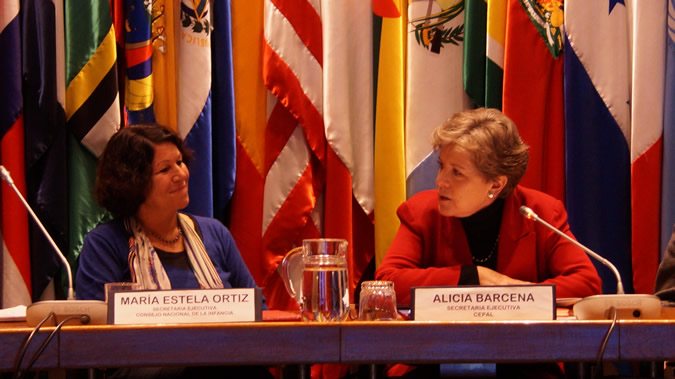
Junio de 2017/Fuente: CEPAL
En la inauguración de un seminario, la Secretaria Ejecutiva de la CEPAL destacó el Sistema de Información de Estadísticas de Niñez y Adolescencia (SIENA) desarrollado por Chile para monitorear la situación de este grupo en el país.
Los niños, niñas y adolescentes siguen siendo la población más vulnerable a la pobreza y la desigualdad en la región, dijo hoy la Secretaria Ejecutiva de la Comisión Económica para América Latina y el Caribe (CEPAL), Alicia Bárcena, quien destacó el desarrollo, por parte de Chile, del Sistema de Información de Estadísticas de Niñez y Adolescencia, SIENA, el que describió como un aporte, que puede transformarse en un ejemplo para otros países.
Alicia Bárcena y María Estela Ortiz, Secretaria Ejecutiva del Consejo Nacional de la Infancia de Chile, inauguraron este viernes 9 de junio un evento en la sede de la CEPAL en Santiago, donde se presentó SIENA ante expertos locales e internacionales.
“Todos los niños y niñas nacen con los mismos derechos inalienables, sin embargo, no todos logran ejercerlos, ya que su goce efectivo está muy condicionado por su lugar de nacimiento, la situación socioeconómica de sus familias, su sexo, su condición étnico-racial, su situación de discapacidad y otros factores”, tema abordado en profundidad en el recién lanzado informe Panorama Social de América Latina 2016 de la CEPAL, apuntó Bárcena.
En las últimas décadas, señaló la alta representante de las Naciones Unidas, la región ha logrado avances importantes en indicadores clave para el bienestar de este grupo de la población, como mortalidad infantil, desnutrición crónica y acceso a la educación; no obstante, aún los niños, niñas y adolescentes están sobrerrepresentados en los quintiles de menores ingresos, persiste el trabajo infantil y son frecuentes víctimas de violencia, enfatizó.
María Estela Ortiz reconoció, por su parte, que uno de los desafíos fundamentales de Chile es el fortalecimiento de sus sistemas estadísticos para el diseño de políticas públicas de calidad, que promuevan un cambio cultural y consideren a los niños y niñas como sujetos de derechos. En este contexto, dijo, “SIENA tiene por objetivo visibilizar la situación de los niños, niñas y adolescentes de Chile, a través del monitoreo de indicadores que dan cuenta del ejercicio de sus derechos”.
SIENA entrega información disponible en bases de datos generadas principales por organismos estatales, entre ellos, los ministerios de Desarrollo Social y de Salud, la Subsecretaría de Prevención del Delito, el Instituto Nacional de la Juventud y el Servicio Nacional para la Prevención y Rehabilitación del Consumo de Drogas y Alcohol, entre otros.
Durante su intervención, Ortiz planteó la necesidad de cambiar la relación del Estado con los niños y niñas, y avanzar hacia un enfoque de políticas sociales universales que garanticen los derechos de las personas durante todo el ciclo de vida.
Para Bárcena, romper el silencio estadístico en torno a la situación de la población infantil es crucial construir sistemas de protección integral, que estén en línea con los desafíos de la Agenda 2030 para el Desarrollo Sostenible. “Estamos en un punto de inflexión. El momento es ahora. La urgencia es hoy”, concluyó.
Fuente: http://www.cepal.org/es/noticias/alicia-barcena-ninos-ninas-adolescentes-siguen-siendo-la-poblacion-mas-vulnerable-la
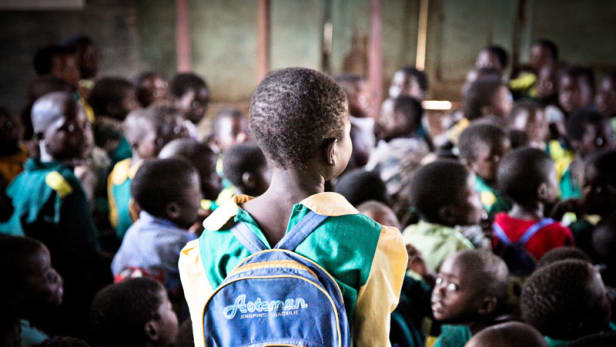
Africa/Abril de 2017/Fuente: Devex
Resumen: El mundo está experimentando una «crisis de aprendizaje», con muchos niños pobres y vulnerables aún siendo excluidos de la escuela, y muchos de los que asisten, emergen con bajos niveles de alfabetización y aritmética que hacen que sea difícil encontrar trabajo, de acuerdo con un informe del Banco Mundial. A los educadores globales se les dio un vistazo preliminar del próximo Informe de Desarrollo Mundial 2018 durante una sesión en el Foro de la Sociedad Civil, una serie de eventos paralelos que forman parte de las Reuniones de Primavera del Banco Mundial en Washington, DC. El informe se centrará por primera vez en la historia del estudio insignia de la institución. Los investigadores que trabajan en el informe dijeron que optaron por centrarse en la educación porque las persistentes deficiencias que identifican son en gran parte no reconocidas por los gobiernos y el sector de desarrollo. «Queremos dejar claro para la comunidad de desarrollo en su conjunto este problema de la exclusión ocultada y la educación de aquellos que necesitan el impulso de la educación», dijo Halsey Rogers, co-directora del próximo informe.
The world is experiencing a “learning crisis” with many poor and vulnerable children still being excluded from school, and many of those who do attend emerging with low literacy and numeracy levels that make it hard to find work, according to a forthcoming World Bank report.
Global educators were given a sneak preview of the upcoming 2018 World Development Report during a session at the Civil Society Forum, a series of side events part of the World Bank Spring Meetings in Washington, D.C. The report, titled “Learning to Realize Education’s Promise,” will focus on education for the first time in the history of the institution’s flagship study.
Researchers working on the report said they chose to focus on education because the persistent shortcomings they identify are largely going unacknowledged by governments and the development sector.
“We want to make it clear for the development community as a whole this problem of the hidden exclusion and education failing those who need the boost from education the most,” Halsey Rogers, co-director of the forthcoming report, said.
The WDR2018, which will be officially launched at the next set of World Bank meetings in October, will address what World Bank Senior Economist Shwetlena Sabarwal described as a “learning crisis” in low- and middle-income countries, where many students are leaving school with low literacy and numeracy levels and without the skills needed to get jobs, she said.
These deficits are likely to be felt even more keenly as markets continue to globalize and advances in technology and automation transform the workforce, making it even harder for students to catch up, Sabarwal said.
“What this means is that when students finish primary school, having spent 4 or 5 years at great personal and opportunity costs to attend school, they are leaving without literacy or numeracy skills. This is what we call the learning crisis,” she said.
For example, in Malawi and Zambia, more than 80 percent of students at the end of the second grade (aged 7) could not read a single word, while in India three-quarters of grade 3 (aged 8) students could not calculate a simple two-digit subtraction. Among older children across 10 Francophone African countries, studies reveal that nearly half of grade 6 students (aged 12) had only basic maths skills and 71 percent could only make basic inferences from reading, according to a concept note published in January.
Sabarwal also referred to “persistent gaps” between levels of achievement between rich and poor students and also between genders, so much so that in some cases “schooling exacerbates social inequity,” she said.
Middle-income countries are also experiencing the learning crisis, Sabarwal said, with attainment levels failing to keep pace with more developed countries. In some instances the highest performing students in middle-income countries perform worse than the lowest performing students in high-income countries, she said. For example, this occurs in Algeria, the Dominican Republic, Republic of Kosovo, and Tunisia, according to the concept note.
Talking about some of the causes of this learning crisis, Sabarwal referred to insufficiently prepared teachers and high absenteeism rates; education and training systems that are out of date and not linked to the needs of the economy; and funding that never reaches the classroom.
The forthcoming report will argue for an increased emphasis on measuring learning and data, drawing on lessons from within and outside the school system to improve education outcomes, such as looking at health and nutrition of the child and addressing technical and political barriers.
The report’s recommendations draw on new thinking, such as advances in cognitive neuroscience, which better our understanding about how children learn; innovative approaches to teacher management; and recent evaluations about education interventions, Rogers said.
The WDR2018 will emphasize the need for better information and metrics about education levels, saying that the learning crisis is currently not being acknowledged by many governments because of a lack of data — “very few countries have systematically measured learning before it’s too late,” Sabarwei said.
“Counties need to start acting as if learning really matters to them — systematically measuring learning and skills, which will allow them to track progress and find gaps,” she added.
However, focusing on measurement and metrics can actually work against school children as standardized testing and a push for results leads to scripted approaches to teaching and an excessive emphasis on examinations, according to Linda Odour-Noah, research consultant at the East African Centre for Human Rights Education.
Odour-Noah said she “did not see daylight” during her final years at school in Kenya due to the obsession with grades and performance.
“Too much of an emphasis on results can lead to schools engaging in teacher-centric approaches and scripted approaches, which don’t elevate needs for children,” she said.
She also criticized the WRD2018 outline for not focusing enough on financing for education, pointing to a “worrying trend of decreasing education budgets” in Kenya, which dropped from 22 percent to 16 percent over the past few years. “There is no chance we can assure accessible, quality education if we are not financing it sufficiently,” she warned.
Katie Malouf, policy advisor at Oxfam International, agreed that the report needs to focus more on financing. “There is a loud silence on the importance of financing for education and the relationship between financing and learning,” she said, pointing to recent research from the OECD’s Programme for International Student Assessment showing a “clear correlation between expenditure on education and learning outcomes increasing.”
Fuente: https://www.devex.com/news/world-bank-says-world-is-experiencing-a-learning-crisis-for-school-leavers-90093
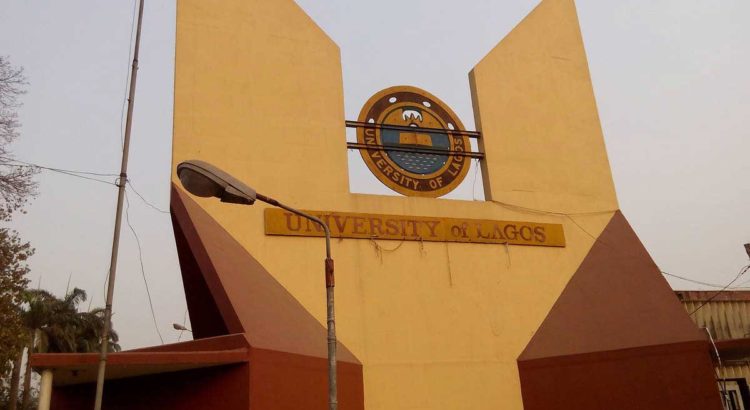
África/Nigeria/Noviembre de 2016/Fuente: The Guardian
RESUMEN: Nigeria y, de hecho, el continente africano deben trabajar para mejorar su stock de científicos, si se debe observar un crecimiento acelerado, incluido el desarrollo económico, social y sostenible. Esto establece, por lo tanto, el imperativo de reposicionar la enseñanza y el aprendizaje de la ciencia en el país y en el continente, que es el nexo para realizar esto. Este fue el consenso de los expertos que convergen en la Universidad de Lagos (UNILAG), para el Festival Anual de Ciencia, Tecnología, Ingeniería, Medicina y Matemáticas (STEMM), organizado por la Fundación de Embajadores Científicos (SAF).
Nigeria and indeed the African continent must work towards improving her stock of scientists, if accelerated growth, including economic, social and sustainable development must be witnessed.
This therefore establishes the imperative to reposition the teaching and learning of science in the country and on the continent, which is the nexus to realising this.
This was the consensus of experts who converge on the University of Lagos (UNILAG), for the yearly Science, Technology, Engineering, Medicine and Mathematics (STEMM) Festival, organised by Science Ambassadors Foundation (SAF).
The forum, which had as its theme, “Experiential Science Education: Prerequisite For Sustainable Development In Nigeria,” had over 100 public and private schools in attendance.
Head, Polymer and Textile Technology Division, Federal Institute of Industrial Research (FIIRO), Oshodi, Lagos State, Dr. Chika Ezeanyanaso, in her keynote address, highlighted the need for government at all levels to urgently incorporate experiential science education in its educational policies and ensure its strict implementation.
Enumerating the importance of science education in our individual and national lives, she said, “Experiential science education would not only help increase scientific literacy in the country, it would also excite and enthuse children with a sense of awe and wonder at the natural world. It would make them to be proficient at practical work and use of scientific equipment; aid them to know, understand at an abstract level, and be able to apply important scientific theories.
“For any nation, including Nigeria, to attain sustainable development, there is need to recognise science education as a priority area of education for her citizens. Science education is vital to promote a culture of scientific thinking and inspire citizens to use evidence-based reasoning for decision making. It would ensure that citizens have the confidence, knowledge and skills to participate actively in an increasingly complex scientific and technological world.
Country Director of SAF, Mrs. Chinyere Nnabugwu, in her presentation, said, “Advancement and growth of a country depends on trade. This has been so for ages past. The only difference is in the product or service used as a medium of exchange. In the 21st century and beyond, Information and Communications Technology (ICT) are the driving force for the vibrant economies of the industrialised nations.
“Taking a cue from most developed nations, we will discover that their curriculum and science education policy, and its implementation are key ingredients to their technological advancement.”
It is therefore key to note that some countries export human capital as a source of revenue. Looking inwards, Nigeria is blessed with resources (human and material) for the astronomical development it clamors for; the missing bridge in the equation has been the technical know-how.
“If this trend goes on unchecked, the current challenges bedeviling our economy as a dependent consuming and unproductive economy will be a joke. It is to this end that we make bold to state that our options are limited if the survival of our nation and wellbeing of our children is of paramount concern to us,” she submitted.
On the way forward she said, “We must advance activities, undertake actions, conceptualise concepts and programmes that will complement that of other stakeholders that will ideally encourage, support, and inspire, our children to explore and be engaged in prospects and platforms in the sciences to create constructive and relevant contribution to the prosperity and posterity of our people and nation.”
Fuente: http://guardian.ng/features/education/africa-needs-more-scientists-for-accelerated-economic-social-development/
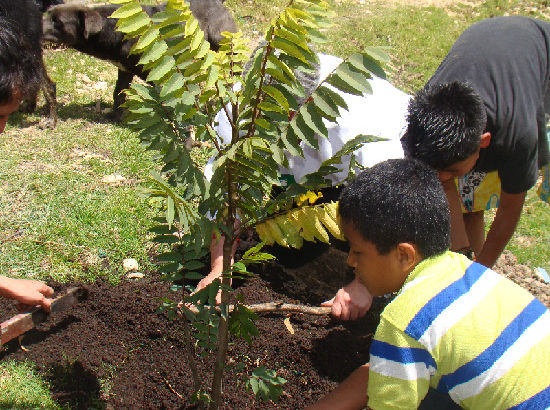
América del Sur/Venezuela/Octubre de 2016/Fuente: Aporrea
La comunidad educativa nacional se reunió este lunes para coordinar, organizar y unificar criterios, capacidades y potencialidades en un solo plan para impulsar al cierre de este año y en 2017 los Conucos Escolares, de desarrollo de la agricultura en los planteles, en función de coadyuvar a la producción de rubros alimenticios que permitan la regionalización del menú en las escuelas y contrarrestar la guerra económica.
En contacto con Venezolana de Televisión desde la sede del Ministerio para la Educación, donde se efectuó el encuentro, el viceministro de Comunidades Educativas y Unión con el Pueblo, Jehyson Guzmán, explicó que han analizado más de 6 mil experiencias en escuelas del país que tributan a la soberanía alimentaria y al Programa de Alimentación Escolar (PAE).
Otro aspecto que se aborda en este encuentro es la articulación con las micromisiones para la recuperación y recolección de las semillas desde los planteles, dijo.
En el contacto informativo, el coordinador del programa Manos a la Siembra, Carlos Lanz, apuntó que actualmente hay 2.400 escuelas, 20 planteles por estado, «que son escuelas punto y círculo que tributan a la alimentación escolar en pequeña escala».
«La siembra es una estrategia curricular del Ministerio de Educación y eso involucra entonces que tenemos que formar las madres procesadoras, la gente que trabaja en la Misión Robinson Productiva, y vincularnos a la formación permanente (…) Tenemos que trabajar por producir nuestras propias herramientas, sembrar ciclos cortos o rubros priorizados», expresó.
A esta reunión asistieron los responsables de la Misión Robinson Productiva, los coordinadores del plan Manos a la Siembra, del PAE, así como madres procesadoras, entre otros.
Fuente: http://www.aporrea.org/pachamama/n299140.html
Imagen de archivo

África/Nigeria/Octubre de 2016/Fuente: The News
RESUMEN: La Coalición de la Sociedad Civil Acción sobre Educación para Todos (CSACEFA), ha hecho un llamamiento para la implementación de una política de educación gratuita y obligatoria de 12 años en Nigeria. Ms Chioma Osuji, Asesor de Políticas, CSACEFA hizo el llamado en una entrevista con la Agencia de Noticias de Nigeria (NAN) en Abuja el miércoles. Dijo que la política, de acuerdo con NAN, debe promocionar la educación de calidad y el desarrollo sostenible y ayudar a materializar los Objetivos de Desarrollo Sostenible (ODS). Osuji dijo que la política de 12 años era necesario ya que cubriría tanto básica y la educación secundaria superior. Osuji agregó que la implementación de la política conduciría a la retención de más niños en la escuela y que les permita completar la escuela secundaria. Según ella, la política reduciría el número de niños que abandonan la escuela debido a la pobreza.
The Civil Society Action Coalition on Education For All (CSACEFA), has called for the implementation of a 12-year compulsory free education policy in Nigeria.
Ms Chioma Osuji, Policy Advisor, CSACEFA made the call in an interview with the News Agency of Nigeria (NAN) in Abuja on Wednesday.
She said that the policy would, according to NAN, promote quality education and sustainable development and help actualise the Sustainable Development Goals (SDGs).
Osuji said that the 12-year policy was necessary as it would cover both basic and senior secondary education.
She said this should replace the nine-year policy currently implemented by the Universal Basic Education Commission [UBEC].
Osuji added that implementing the policy would lead to the retention of more children in school and allow them to complete secondary school.
According to her, the policy would reduce the number of children that drop out of school due to to poverty.
The policy advisor believed that the free education policy would lead to higher literacy level and bridge the education gap among poor children.
“The nine years free education policy is not enough to promote development in the country as the children of the poor mostly drop out of school after Junior Secondary School education.
“If Nigeria wants to compete globally in terms of education, then there is urgent need to increase the free education policy to 12 years.
“The poor are the most marginalised in our society and for growth to be sustained and poverty reduced, they should be encouraged to go to school,’’ she said.
She charged the UBEC to consider the policy, stating that it is achievable.
On the re-introduction of History as a subject in secondary schools, Osuji said it was a welcome idea.
She described the initial removal of the subject as “a disaster waiting to happen.”
Osuji added that if the children don’t study history, they would never tell the story of how “Nigeria came about, and our origin would be lost in the future as generations to come would be totally ignorant.”
NAN recalls that the Minister of Education, Malam Adamu Adamu at the 2016 National Council on Education meeting, announced the re-introduction of the subject in secondary schools.
Fuente: http://thenewsnigeria.com.ng/2016/10/ngo-calls-for-free-education-in-nigeria/